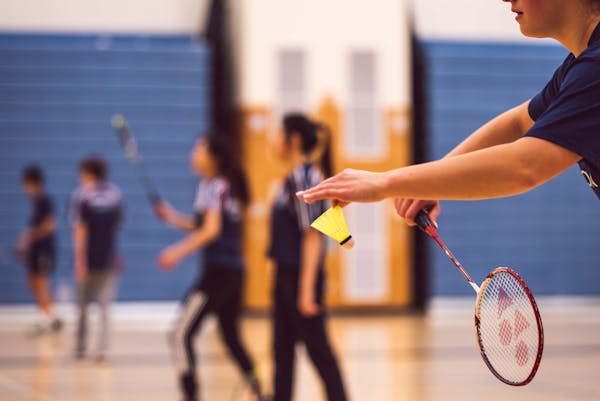introduction:
Badminton, a sport often played in backyards, gyms, and
professional arenas alike, offers a unique blend of athleticism, strategy, and
finesse. If you're new to the game or looking to brush up on your skills, fret
not! This beginner's guide will walk you through the basics of playing
badminton and help you embark on your journey to becoming a shuttlecock
virtuoso.
Getting Started:
Equipment:
The first step in playing badminton is gathering the
necessary equipment. All you need are racquets, a shuttlecock (also known as a
birdie), and a net. Racquets come in various shapes and sizes, so choose one
that feels comfortable in your hand. As for the shuttlecock, opt for feather or
plastic varieties based on your preference and skill level.
Court Setup:
Badminton is typically played on a rectangular court divided
by a net. The dimensions of the court vary depending on whether you're playing
singles or doubles. Singles matches are played on a narrower court, while
doubles matches utilize the full width. Markings on the court delineate
boundaries and service areas.
Gameplay Basics:
Serving:
The game begins with a serve, wherein one player hits the
shuttlecock diagonally across the net to the opponent's side. The serve must be
underhand and made below waist level. In singles, the serve alternates between
players after each point, while in doubles, each player gets a turn to serve.
Rallying:
Once the shuttlecock is in play, players rally it back and
forth, aiming to keep it airborne and outmaneuver their opponents. Unlike some
other racket sports, badminton allows the shuttlecock to bounce only once
before being returned. Players employ a mix of forehand and backhand shots,
including clears, drops, smashes, and slices, to control the pace and direction
of the rally.
Scoring:
Points are scored when the shuttlecock lands in the
opponent's court or when the opponent commits a fault. A rally ends if the
shuttlecock hits the ground, goes out of bounds, or if a player commits a
fault. Matches are typically played to 21 points, with the winner needing to be
ahead by at least two points.
Key Techniques:
Footwork:
Good footwork is essential in badminton to move quickly and
efficiently around the court. Practice shuffling, lunging, and pivoting to
reach shots effectively and maintain balance.
Grip:
Mastering the proper grip on the racquet is crucial for
generating power and control. Experiment with different grips, such as the
forehand grip and backhand grip, to find what works best for you.
Timing and Accuracy:
Focus on timing your shots and aiming for precision rather
than sheer power. Pay attention to the trajectory of the shuttlecock and
anticipate its movement to execute well-placed shots.
Conclusion:
Badminton is a sport that rewards skill, agility, and
strategy. Whether you're playing for fun with friends or competing at a
competitive level, the fundamentals remain the same. By mastering the basics of
serving, rallying, and scoring, and honing key techniques like footwork and
grip, you'll be well on your way to enjoying the exhilarating experience of
playing badminton. So grab your racquet, step onto the court, and let the games
begin!


.jpeg)
.jpeg)
.jpeg)
.jpeg)
